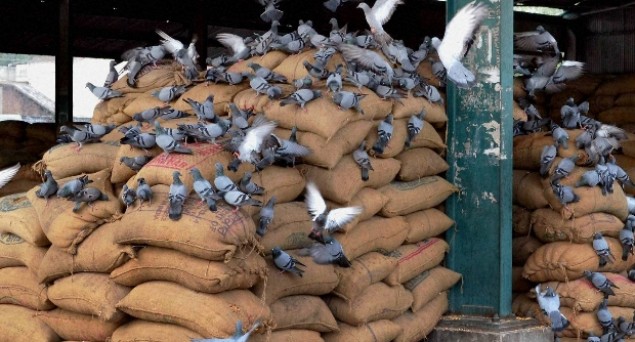By Subramani Arumugam
India ranks 102 out of 117 countries in the Global Hunger Index report for 2019, trailing behind many South Asian countries like Nepal, Pakistan, Bangladesh etc. As per UN-FAO report, 194 million people go hungry every day in India, comprising about 23 per cent of the world’s undernourished population.
On the contrary, India has reached self-sufficiency in agricultural production long back. We produce more than what is estimated to feed the entire population (2018-19, India produced 283.37 million tons of foodgrains). We rank first in millets and second in rice and wheat production in the world. Our horticultural crops like fruit and vegetables production also in surplus (2018-19 313.9 million tons). The total agricultural exports are also on increase.
The contrasting scenarios of record agricultural production and grinding poverty illustrates what is described as the ” paradox of plenty” in the agricultural sector.
Can the Food Corporation of India (FCI) remove this problem?
The Government of India established FCI in 1965 under the Ministry of Consumer Affairs, food and public distribution. It is the largest supply chain management in Asia and second in the world. It has constructed warehouse godowns across the country to store the grains procured from farmers. FCI has to procure directly from farmers at the minimum support price (MSP) fixed by the Commission of Agricultural Costs and Prices (CACP). It has to procure at least 15-20 per cent of wheat and 12-15 per cent of rice production.
The main objective of FCI is to maintain a buffer stock to offset price fluctuations and unforeseen emergencies. The stored grains will be given for public distribution system (PDS), National Food Security Act (NFSA) and other welfare schemes.
Surplus grains will be sold in the Open Market Sale System (OMSS).
It is reported that FCI has a stock of 74.4 million tons of wheat and rice as against the buffer stock norm requirement of 21.4 million tons, which is almost four times the buffer requirement. The corporation has to clear its surplus stock immediately so as to make space for the new rabi crop to be procured.
Wastage of grains
Due to space constraint, about 30 per cent of the grains are stored in open space covered with tarpaulins under covered and plinth storage (CAPS) system. Open storage system is vulnerable to fungus and moisture as it’s exposed to rain, floods etc., which deteriorates the quality. Thus, the decayed food grains which become unfit for human consumption will be sold for cattle feed, manure and other industrial purposes. In one instance rotten grain was found buried in a FCI depot in Kerala which sparked a huge public outcry. Huge quantity is also lost due to rodents and leakage by employees.
According to official data released by the Ministry of Consumer Affairs, almost 62000 tons of foodgrains was damaged in FCI warehouse between 2011 and 2017. In 2016-17 alone, more than 8600 tons of food grains was lost.
WHO reports that around 1.80 million tons of foodgrains per year is spoiled during open storage and 25.9 million tons of rice and wheat due to corruption by employees. About 16 per cent of fruit and vegetables produced are wasted for want of storage facility. The value of food being wasted by India is approximately $14 billion each year.
The waste of grains, mainly wheat and rice, is cruel in a nation with millions of poor living in starvation.
Now central government has announced that NGO’s and charitable organisations who intend to distribute food grains for feeding poor people suffering due to nationwide lockdown can purchase wheat and rice in bulk directly from FCI at a cheaper cost.( rice Rs2250/per quintal and wheat Rs2135/per quintal).This step might have been taken to dispose of the old stock and to make space for the new procurement.
At present ration is supplied through PDS for the family card holders only and crores of people having no family cards are deprived of this. Hence, the government should release additional quantity of grains in the PDS to cater the needs of poor especially the unorganised workers and migrant labourers who are the major victims of the lockdown.
We should make a demand to the central government to release the surplus food grains through PDS for distributing it to the needy instead of allowing the grains to rot in the depots, as the Centre itself has declared Covid-19 as national disaster.
(The writer of the article is National General Secretary, Welfare Party of India)





